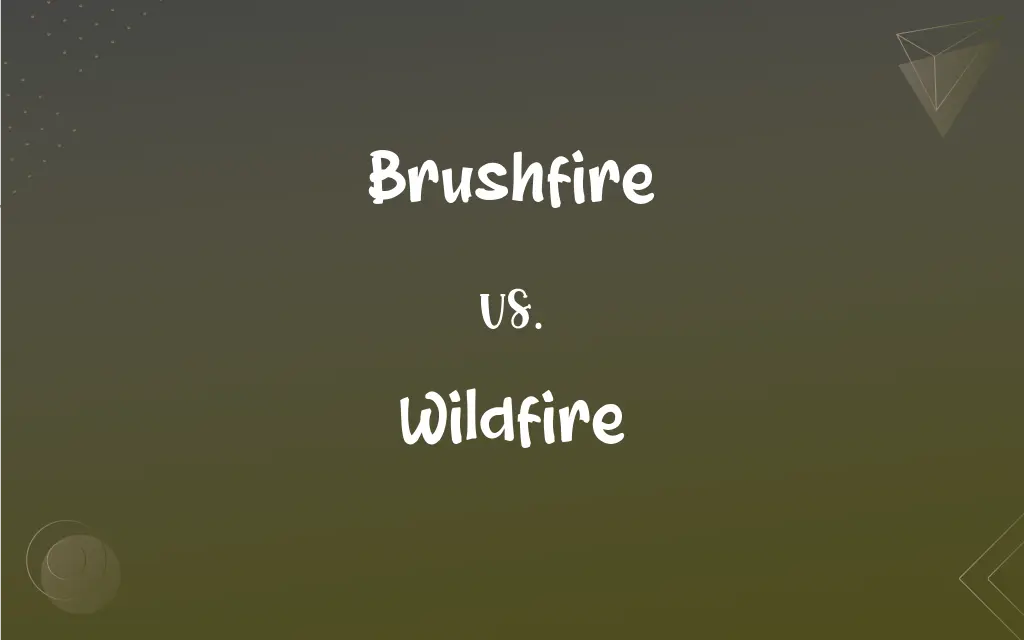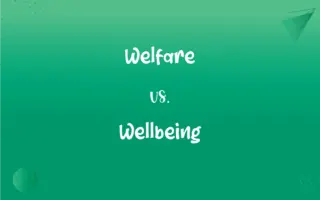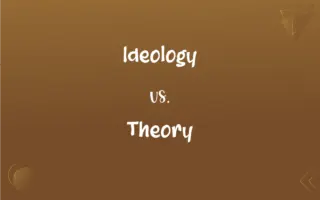Brushfire vs. Wildfire: What's the Difference?
Edited by Aimie Carlson || By Janet White || Published on December 26, 2023
Brushfires are smaller, localized fires in brush or scrubland, while wildfires are large, uncontrolled fires in wild areas like forests.

Key Differences
Brushfires typically occur in brush or scrubland, characterized by smaller, more contained fires. Wildfires, in contrast, refer to large, uncontrolled fires, often in forests or wildlands. Brushfires can be a subset of wildfires, but not all wildfires are brushfires due to their scale and location.
Brushfires often result from specific, localized conditions like dry brush and can be quickly managed. Wildfires spread rapidly, fueled by a combination of factors like wind, dry conditions, and abundant fuel sources like trees and underbrush. Wildfires are more unpredictable and challenging to contain than brushfires.
The impact of brushfires is generally localized, affecting the immediate area. In contrast, wildfires can have far-reaching impacts, including air quality issues, habitat destruction, and economic losses over a much larger area. Wildfires often require more extensive resources for management and control.
The causes of brushfires can be both natural and human-induced, such as lightning or careless human activity. Wildfires also share these causes but are more likely to become major disasters due to their size and intensity. Both types of fires can be exacerbated by climate change and human land use.
Management strategies for brushfires include quick response by local fire services and controlled burns to prevent spread. For wildfires, management involves larger-scale efforts like aerial firefighting, evacuation plans, and inter-agency cooperation. The approach to managing wildfires is more complex due to their scale.
ADVERTISEMENT
Comparison Chart
Size
Smaller, localized
Larger, covering wide areas
Location
Often in brush or scrubland
Commonly in forests or wildlands
Spread
Typically slower and more contained
Rapid and expansive, often unpredictable
Impact
Localized, affecting immediate area
Widespread, with far-reaching consequences
Management
Quicker response, local fire services
Large-scale efforts, multi-agency coordination
ADVERTISEMENT
Brushfire and Wildfire Definitions
Brushfire
Brushfire denotes a fire burning in low-lying vegetation, often easily controllable.
A small brushfire broke out near the hiking trail but was quickly extinguished.
Wildfire
Wildfire denotes a highly destructive natural fire in wildland areas.
The intensity of the wildfire destroyed thousands of acres of forest.
Brushfire
Brushfire refers to a minor fire in rural or semi-rural areas, primarily involving vegetation.
The recent drought has increased the frequency of brushfires in the region.
Wildfire
Wildfire refers to an extensive, fast-spreading fire in rural or wilderness regions.
The team of firefighters battled the wildfire for days to protect the nearby villages.
Brushfire
Brushfire can also refer to a non-literal, minor conflict or problem.
The debate sparked a brushfire of controversy in the community.
Wildfire
A wildfire is an unplanned, uncontained blaze affecting natural areas.
The remote wildfire was difficult to access, complicating firefighting efforts.
Brushfire
A brushfire is a small, localized fire in brush or scrubland.
The firefighters quickly contained the brushfire before it could spread to nearby homes.
Wildfire
Wildfire can metaphorically refer to something spreading rapidly and uncontrollably.
The news of the celebrity's visit spread like wildfire across social media.
Brushfire
A brushfire is a type of wildfire that is limited in scope and intensity.
They organized a volunteer team to monitor for brushfires during the dry season.
Wildfire
A wildfire is a large, uncontrolled fire in a wild area like a forest.
The wildfire spread rapidly due to the strong winds and dry conditions.
Brushfire
A fire in low-growing, scrubby trees and brush.
Wildfire
A raging, rapidly spreading fire.
Brushfire
A relatively minor crisis.
Wildfire
Something that acts very quickly and intensely
A land swept by the wildfire of revolution.
Brushfire
Minor enough to involve only small-scale mobilization of counteracting resources
Brushfire wars.
Wildfire
Lightning occurring without audible thunder.
Brushfire
A large fire in a scrubland or prairie, as opposed to a forest fire, which happens in forests.
Wildfire
A luminosity that appears over swamps or marshes at night; ignis fatuus.
Brushfire
A war that does not directly involve the world's superpowers.
Wildfire
A highly flammable material, such as Greek fire, once used in warfare.
Wildfire
A rapidly spreading fire, especially one occurring in a wildland area.
Wildfire
(historical) Greek fire, Byzantine fire.
Wildfire
(dermatology) A spreading disease of the skin, particularly erysipelas.
Wildfire
(figuratively) Something that acts or spreads quickly and uncontrollably.
Wildfire
A composition of inflammable materials, which, kindled, is very hard to quench; Greek fire.
Brimstone, pitch, wildfire . . . burn cruelly, and hard to quench.
Wildfire
An old name for erysipelas.
Wildfire
A sort of lightning unaccompanied by thunder.
Wildfire
A raging and rapidly spreading conflagration
FAQs
Can brushfires lead to larger fires?
Yes, brushfires can escalate into larger fires under dry conditions and strong winds.
Are brushfires common in urban areas?
Brushfires are less common in urban areas and more frequent in rural or semi-rural regions.
How are brushfires controlled?
Brushfires are controlled by local fire services, often using water and creating firebreaks.
How do brushfires start?
Brushfires can start from natural causes like lightning or human activities such as campfires.
What's the difference between a brushfire and a wildfire?
Brushfires are smaller and localized, while wildfires are larger and can cover vast areas.
Do brushfires contribute to ecosystem health?
In some ecosystems, brushfires can play a role in maintaining biodiversity and habitat regeneration.
What causes wildfires?
Wildfires can be caused by natural factors like lightning or human factors such as arson.
What is a brushfire?
A brushfire is a small, localized fire in brush or scrubland.
How do wildfires affect the environment?
Wildfires can have significant impacts, including habitat destruction, soil erosion, and air pollution.
How do humans exacerbate wildfire risks?
Human activities like deforestation, land development, and climate change increase wildfire risks.
Are there benefits to wildfires?
Controlled wildfires can reduce underbrush, preventing larger fires and promoting new growth.
How are residents warned about wildfires?
Residents are warned through emergency alerts, news broadcasts, and local authorities.
What is a wildfire?
A wildfire is a large, uncontrolled fire in wild areas like forests or grasslands.
Can brushfires affect air quality?
Yes, even small brushfires can impact local air quality, especially for sensitive groups.
What is fire management?
Fire management involves planning, prevention, suppression, and rehabilitation related to fires.
Are wildfires natural occurrences?
Wildfires can be natural but are increasingly influenced by human activities and climate change.
How do wildlife adapt to brushfires and wildfires?
Some species have adapted to escape, survive, or even thrive after fires, but many are adversely affected.
What are the challenges in fighting wildfires?
Challenges include accessibility, scale, weather conditions, and resource allocation.
How does climate change affect brushfires and wildfires?
Climate change leads to hotter, drier conditions, increasing the frequency and intensity of these fires.
Can people prevent brushfires and wildfires?
Yes, through responsible land and fire management, and by following fire safety guidelines.
About Author
Written by
Janet WhiteJanet White has been an esteemed writer and blogger for Difference Wiki. Holding a Master's degree in Science and Medical Journalism from the prestigious Boston University, she has consistently demonstrated her expertise and passion for her field. When she's not immersed in her work, Janet relishes her time exercising, delving into a good book, and cherishing moments with friends and family.
Edited by
Aimie CarlsonAimie Carlson, holding a master's degree in English literature, is a fervent English language enthusiast. She lends her writing talents to Difference Wiki, a prominent website that specializes in comparisons, offering readers insightful analyses that both captivate and inform.






































































